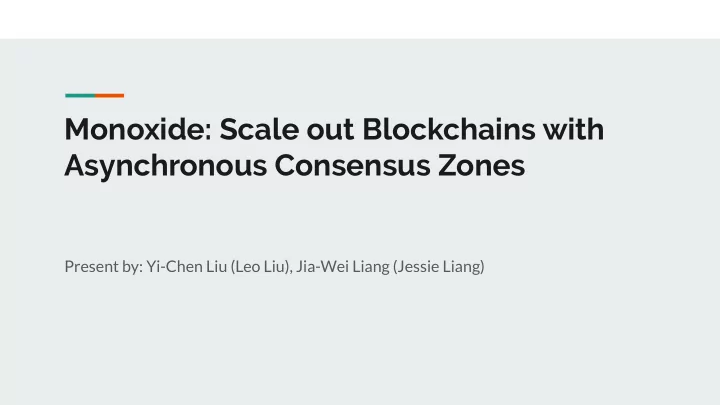

Monoxide: Scale out Blockchains with Asynchronous Consensus Zones Present by: Yi-Chen Liu (Leo Liu), Jia-Wei Liang (Jessie Liang)
● Overview Agenda ● Purpose and Goal 2019/11/18 ● System Structure ● Security Discussion
Overview
Overview Topic 1 : Asynchronous consensus zone => minimize storage and communication Topic 2: Eventual atomicity => ensure transaction atomicity across zones Topic 3: Chu-Ko-Nu mining => ensure the effective mining power in each zone to be at the same level of the entire network
Purpose and Goal
Current Flaws of Blockchain Low scalability and usability of networks Duplicated communications Low throughput and storages
Why Scalability Important? Real-World Applications Cryptocurrency ● VisaNet: 4K transaction per sec. ● Bitcoin: 7 transaction per sec. ● Alipay: 256K transaction per sec. ● Ethereum: 15 transaction per sec.
Goals and Contributions ● Lower storage burdens and speed up! Divide the whole network into several sub-network (Zones) ○ Eventual Atomicity principle ○ ● Reinforce system’s security ○ Chu-ko-nu mining protocol was introduced
System Structure
Blockchain Confirmed Block Fork Orphan Block
Blockchain - Merkle Tree Transactions
Blockchain - Storage
Blockchain - Size
New Approach - Concept Zone 0 Zone 1
New Approach - Partitioning and Naming Nodes’ Address = public key ● The first k bit of public key indicate the zone that the node belongs to ● Zone 2 Zone 0 … Zone Zone 3 Zone 1
New Approach - Miner's Rule Only responsible for mining transactions that happen within the zone ● Any full node only records the chain for balances of users in its own zone ●
New Approach - Simple Transaction Example Inner-Zone Transaction: follow the original blockchain approach ● Cross-Zone Transaction: (Zone A) X send $ to (Zone B) Y ● Miner in Zone A check X’s balance ○ Miner in Zone A create confirm block in Zone A ○ Miner in Zone A create relay block, then send to Zone B ○ Miner in Zone B receive the relay block, then create confirm block in Zone B ○
New Approach - Detail Block Structure Zone indicator Pointer to previous block Adjusting Nonce to meet Target
New Approach - Detail Block Structure (Cont.)
New Approach - Transaction Verification Attribute set γ should be confirmed and matched with the originate block ● γ := <s, k, t , p, {hq}> ○
New Approach - Block Verification Check 3 types of transactions: ● Confirmed initiative transactions in its own zone. ○ Inbound relay transactions previously forwarded from other zones. ○ Outbound relay transactions forwarded to other zones. ○ Any block containing illegal transactions or mismatched pairs of initiative/relay transactions will be ● rejected
New Approach - Eventual Atomicity Withdraw first, Deposit Later ● Assumption 1: once the withdraw operation is confirmed, the deposit operation will be executed. ○ Assumption 2: withdraw operations will be picked as long as there are well-behaved miners ○ Withdraw from Zone A to Zone B
New Approach - Eventual Atomicity (Cont.) What if no one picks up the relay block? ● The relay block will exist eternally unless the originate block has been dropped ○ What if the relay block has been dropped accidentally? ● A new relay block will be generated automatically from the original zone ○ Creating multiple blocks for a single transaction means inevitable latency might occur? ● Mining works between zones are independent ○
New Approach - Eventual Atomicity (Cont.) Malicious Miners. What can we do? ● Creating empty blocks without confirming any transaction, neither for normal transactions and relay ones. ○ Solution: there will be someone honest to create valid block. Don’t worry. And, the chance is rare! ○ True? ~19% ! Of the current total of 546,237 mined Bitcoin blocks, 101,215 of them were empty blocks.
Security Discussion
Per-Zone Security H: The mining power of the entire network ● N: The total number of Zones ● Per-Zone mining power = H/N ● If a malicious participate has T mining power, which T > H/N*50%, the participant can control the zone.
Chu-ko-nu Mining Goal: raise the attacking bar in each Zone from H/N*50% to H*50% ● Allow miners create multiple blocks and broadcast to n Zones, where n < N ● To increase the efficiency, miners only need to calculate PoW once ● In each zone, full nodes, as well as miners, treat batch-chaining-blocks and chaining-blocks equally ● when accepting a new block 51% Attack
Chu-ko-nu Mining ● τ: PoW target ● b: Zone Index ● η: Nonce
Thank You Present by: Yi-Chen Liu, Jia-Wei Liang
Recommend
More recommend